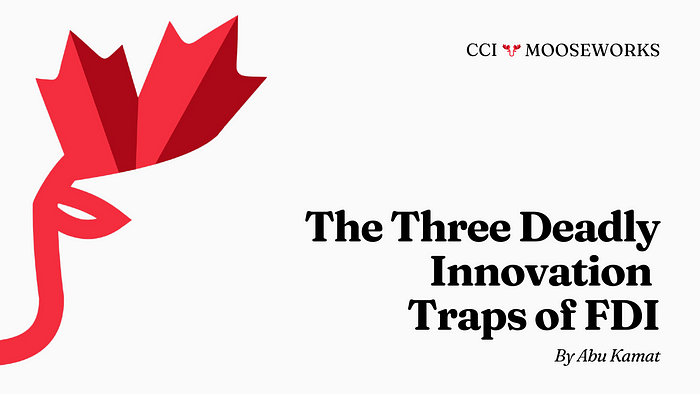
CCI Mooseworks: The Three Deadly Innovation Traps of FDI
By Abu Kamat
For many decades, Canadian politicians have treated foreign direct investment (FDI) as an unalloyed benefit for the economy. They have subsidized foreign multinationals and worked to lure those companies to set up shop here.
FDI can be an important catalyst for growth for traditional, production-based economy and for developing countries that need to build their industrial base. But in an economy where biggest value resides in intangible assets, we need to look closely at all its effects. FDI in tech is extractive and technology, knowledge and data assets, senior executive personnel, tax base and wealth effects flow out of countries that receive foreign investments, hindering innovation in the host country. Policymakers should reassess their approach to foreign investment in Canada’s innovation economy.
The shift of value to intangibles — especially data and intellectual property (IP) — has been revolutionary, completely upending the structure of competitive markets. In the past, wealth and power came from physical assets and global supply chains. The new economy’s winners are those that commercialize intangible assets like software, data, services, brands, and expertise and exclude others from participating in markets.
This new reality should change our thinking about foreign investment — the dynamics of intangibles-driven wealth are fundamentally different. And this is a growing area of importance; one study has found that 90% of the value of the S&P 500 is in intangible assets compared 17% in the 70’s. Another study showed that intangibles make up 40% of all investment in the United States and ten European economies, up 29% from 1995.

In this knowledge-based economy, FDI comes in several guises, each with their own extractive implications. The three described below are the deadliest innovation traps of the new economy.
Branch plants, where a foreign company sets up shop in another country, employing local talent to conduct research, generate data, and produce IP, are the most visible. In the past decade, global tech giants like Amazon, Microsoft, and Google have all established ‘branch plant’ offices in Canada. Federal and provincial governments have also championed policies centred around courting foreign firms to establish, invest in and maintain a regional presence. The Strategic Innovation Fund, one of Canada’s largest innovation programs, has doled out large sums to companies like Mastercard, Siemens and most recently Nokia. This year alone, the federal government has announced a $470 million partnership with Ericsson and a $13.5 billion commitment to bring Volkswagen to Canada and build branch plants as part of global supply chains for electric vehicle batteries. And let’s not forget the $125 million Artificial Intelligence Strategy that lured about 50 foreign companies, including Meta, Google, and Samsung to Canada to hire domestic AI talent, which was — and still is — in very limited supply, especially for local firms.
While such announcements make for great political headlines, an innovation strategy based on bringing foreign firms to Canada in the name of job creation misses the essential point — Canada is in the second decade of negative unemployment for tech talent. Foreign branch plants don’t create new jobs, they merely re-shuffle existing talent and create talent shortages for domestic firms. Valuable intangible assets — the real value of a company — produced by the branch plant are relocated to the foreign company’s headquarters, where they are taxed, commercialized, and sold as new products or services. In essence, the flow of wealth and benefits from these assets is outward. Governments are inadvertently giving away the farm for the sake of a few hundred jobs — none of which are new. In the case of the government sponsored AI Strategy, inventors filed 232 patents. Of those, 75% are now owned by foreign entities.
Another form of FDI in the intangible economy is ‘killer’ mergers and acquisitions — when foreign firms acquire domestic technology companies that could potentially challenge their market dominance. This anti-competitive strategy stifles the growth of promising domestic companies and impedes their ability to contribute to domestic wealth. From a policy perspective, Canada has a weak track record of holding big tech companies accountable relative to other jurisdictions like the EU, thanks to gaps within the Competition Act that enable anti-competitive behaviour. The Bureau itself has acknowledged that the legislation doesn’t empower them to consider long-run dynamic effects on the local ecosystem.
Lastly, FDI can take the form of partnerships with universities. These collaborations can be beneficial for students and institutions in the short term. Top students work with global companies like Huawei, Google, and Microsoft on funded, collaborative projects to create unique solutions. Without careful oversight, though, these partnerships facilitate the extraction of valuable intellectual property and talent — sometimes even compromising national security. More recently, a study conducted by the Centre for International Governance Innovation found that foreign companies own more than 55% of the IP generated from publicly funded universities, making Canadian technology companies less competitive by preventing them from practising in the space of the foreign-owned IP.
Considering the reality of an intangibles-driven economy, policymakers should change how they think about the impact of FDI on the domestic economy and companies. Rather than only focusing on job creation, they need a more nuanced lens that accounts for negative spillovers, such as IP leakage and the implications for smaller, scaling companies hungry for talent.
Countries around the world have retooled their foreign investment policies to reflect this line of thinking. Australia, for instance, allows research agreements to be invalidated if deemed potentially adverse to its economy and security. The UK has implemented a screening regime for foreign investment, safeguarding national firms and considering security, particularly in strategic technology sectors. Understanding the relationship between intangible assets, FDI and innovation is one key to fostering a Canadian ecosystem with more thriving and globally competitive domestic champions.
CCI Mooseworks is the Canadian innovation and economic policy newsletter of the Council of Canadian Innovators — a national business council dedicated exclusively to high-growth scale-up technology c ompanies. To receive these posts directly to your inbox, subscribe here.
